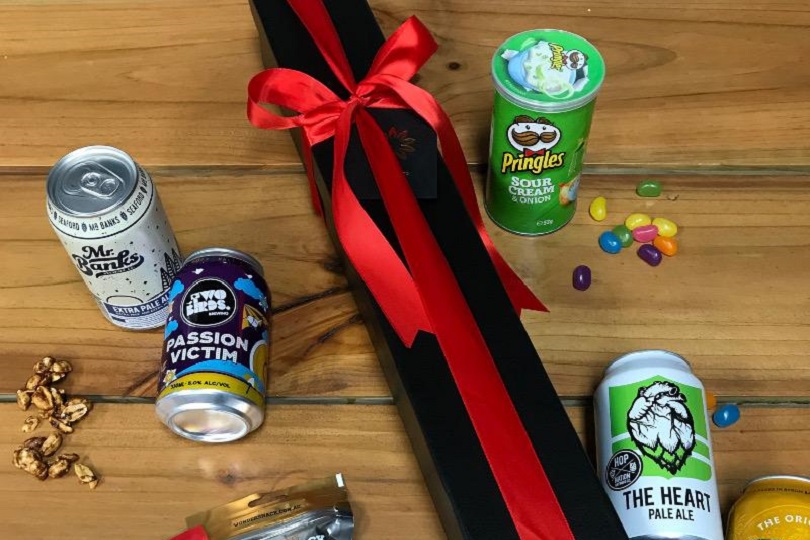Top 50 Q&A: Richard Kelsey, Beer Cartel

Welcome to our weekly Q&A with Internet Retailing’s 2019 Top 50 People in E-Commerce. You can find this year’s Top 50 report here, and see our previous Q&As here.
This week, Internet Retailing interviews Richard Kelsey, co-founder and director of Beer Cartel. Kelsey placed 21st in this year’s report.
Short on time? Here are the three key takeaways from the interview:
- Beer Cartel approaches its position in the sector in three ways: positioning, platform and product.
- A consumer move to canned beer has helped tackle the issue of fragility in transporting beer.
- Stay on the look-out for New England India Pale Ale.
Internet Retailing: What does an average day look like at Beer Cartel for you?
Richard Kelsey: We’re a small team, which means myself and the rest of the team wear many hats and there is always a lot to do.
My average day often involves planning new products for the website, working on marketing, strategy planning, working on developing new systems to make us more effective and occasionally helping the team with orders.
The hardest part of my day I find is blocking out distractions to focus on the core tasks at hand. Just wish I had more time and less emails!
IR: Beer Cartel is known for its ‘brewquet’ offerings, typically revolving around a holiday such as Christmas, Valentine’s Day, or Easter. Where did this idea come from? What goes into creating one of these ‘brewquets’? How have these products evolved over the years the company has been creating them?
RK: Brewquets (pronounced brew-kays) is actually our sister company which was started just underthree years ago. It offers bouquets of beer (our brewquet) that are designed to look similar to a bouquet of flowers.
The business was started to trying to fill a gap in the market – flowers are an obvious gift for women, but there has never been a straightforward male equivalent. Brewquets are that equivalent and are perfect for those – male or female – who like to drink beer.
Originally, Brewquets was a one-man business, it was overly complex and struggling to grow because of this. We purchased the business in early 2018 and have been working on systemising it for the last 12 months, improving the customer experience while also building up the range.
The latest products have been focused around cans, both beer and wine. One of our real successes we’ve seen this year was our Long Stem Brews, which included 4 beers in cans, plus gourmet nibbles delivered in a long stem rose box.
It received a great reception from those who purchased it for Valentine’s Day and provided a great option for females looking to give their partner something on the day.

IR: Beer Cartel has a pretty informal tone running through its website and marketing. Have you noticed a difference in how customers respond to the way the brand uses language?
RK: The language we use has been pretty similar from the day we first launched. Beer is a playful and fun category, if you tried to be too straight-laced consumers would not buy into it, so there definitely needs to be a degree of casualness with the language used.
While we do have a pretty relaxed tone we also offset this with a big focus on beer education and being an authority in the beer space, so we’re not just seen as a joker, but as a strong source of knowledge.
IR: The alcohol delivery market is beginning to heat up, with a number of new players having launched, or refocused, over the last year or so. What is Beer Cartel doing to keep itself ahead of the pack? What is the business strength?
RK: We started Beer Cartel back in 2009, we were online even before Dan Murphy’s! The alcohol delivery space has grown enormously since then, with new competitors regularly starting up (as well as disappearing).
We’ve approached being a market leader in the craft beer category from three different points; our positioning, platform and product.
Positioning-wise, we don’t just want to be a voice in the market we want to be the knowledge-holder that people look to to learn about craft beer.
We started the Australian Craft Beer Survey back in 2016 and make all the findings from this study completely public.
It has meant we’re regularly referenced by media commentators, plus are the go-to source for the industry.
Over 40,000 people have completed the survey in three years, which has meant there are a lot of people getting to know us. Outside of this we regularly write blogs and do social media posts that relate to beer education.
We also release the Top 50 Australian Craft Beer list each year which gets a lot of traction amongst the craft beer public.
From a platform point of view we’re always looking at ways to evolve this. E-commerce is rapidly changing, so you can never keep still, you always have to evolve. We’re just in the process of planning our next big platform innovation which is always a pretty massive project.
From a product point of view, it is about finding amazing products that really resonate. One that has gone amazingly is our beer advent calendar, which we’ve sent to over 10,000 consumers Australia-wide.
Our advent calendar is similar to your traditional advent calendar, it counts down the days in December to Christmas but instead of having a chocolate inside there is a different Australian Craft Beer.
Ever since its first launch the beer advent calendar has been absolutely loved and now accounts for a significant share of our overall revenue.
IR: What are some difficulties in sourcing, store and shipping such niche items?
RK: There are some definite challenges with selling craft beer. We have over 1000 different beer SKUs on offer at any one time and have always worked on the adage that fresh is best – we want to get the freshest, tastiest beer into consumers hands so that they have the best possible experience.
This means we typically order in small amounts so that we are turning stock over frequently. We keep a very watchful eye on beer dates and have less than 1 per cent of our range which are approaching the recommended drinking date. Beer being fragile is also a real challenge.
Thankfully over the last few years there has been a real shift to beer in cans which is great as it is a much more robust vessel. Across the products we sell, we are pretty careful with everything and spend lots on protective packaging plus using Australia Post’s fragile wine service.
IR: Anything else you’d like to add? Any upcoming beer recommendations?
RK: You couldn’t have a write-up on a craft beer business without a beer recommendation! The biggest trend we’ve seen over the last 12 months has been the growth of New England India Pale Ales (NEIPAs).
Aside from being a long-winded name the beers are known for their hazy appearance, low bitterness and great juicy aromas and flavours. It’s a style that will keep growing over the next few years.
It has a relatively short shelf life, so don’t expect it to find at many of the mainstream liquor stores, but you will find them from time to time at good independent bottle-shops, or of course head online and visit us!
Comment Manually
You must be logged in to post a comment.

No comments